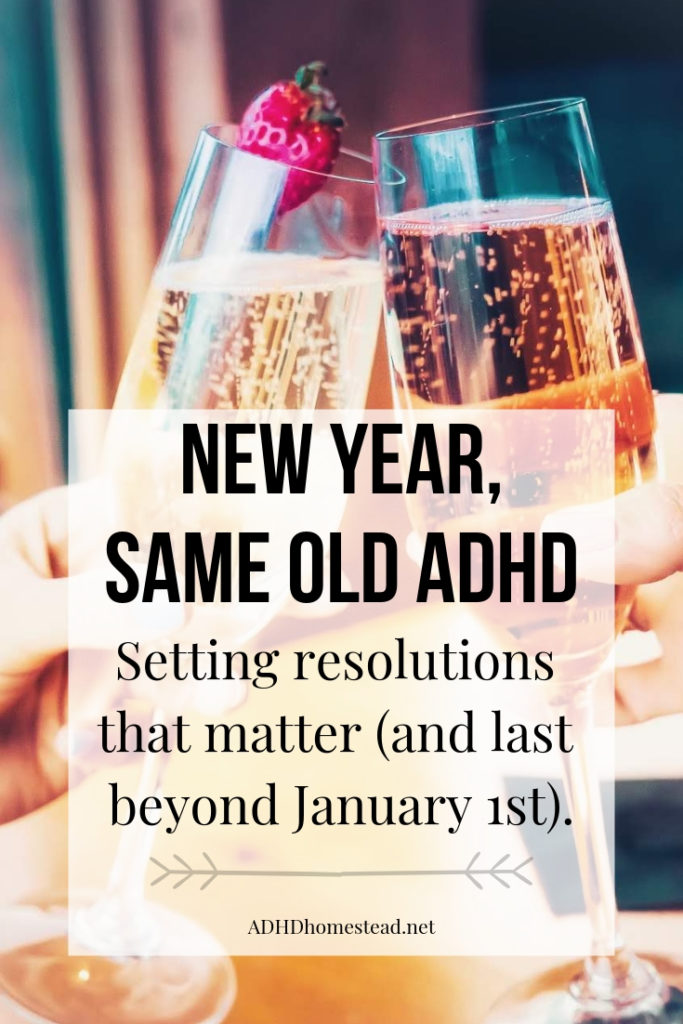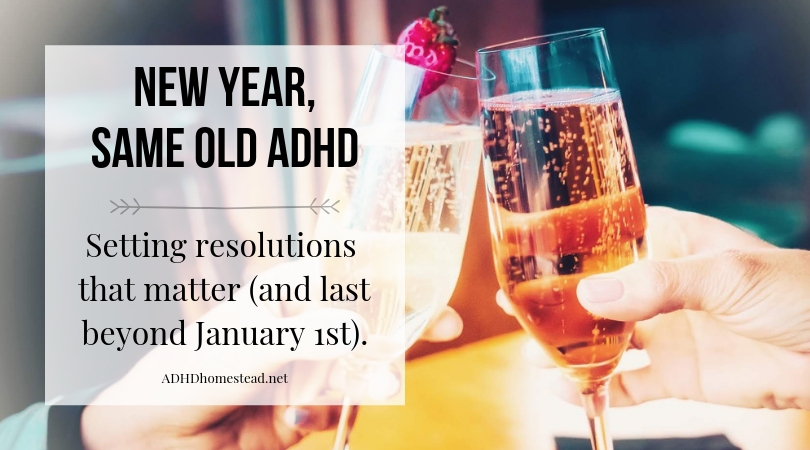I have a complicated relationship with New Year’s resolutions. I bet a lot of ADHDers do. Setting intentions for the year ahead — or imagining the future at all — brings up conflicting emotions. I usually process them in this order:
- Yay! A clean slate! Anything is possible!
- This feels wonderful. I love imagining all the great things I’m going to do.
- Setting goals gives me hope that this year, I’ll finally make a positive change in my life.
- But setting goals also reminds me that I’m not the kind of person who actually achieves anything.
- Watching my hope and enthusiasm slowly deflate makes me wish I’d never considered setting goals in the first place.
And that’s on a good year. We’ve all had years when we’ve started and ended with #4.
Setting goals with ADHD: should we even bother?
ADHD makes us vulnerable to several goal-setting pitfalls. Among them:
- Setting too many goals (we can’t pick just one!)
- Setting unrealistically ambitious goals
- Not connecting our goals to anything we set out to accomplish in previous years

People with ADHD love to imagine Big Things. New Things. Without that rush of excitement, what’s the point?
Other times, we get so caught up in the fun of setting New Year’s resolutions, we forget to ask ourselves why. Why is this important? How will this goal help me become the best version of myself?
We end up with a set of impossible goals that make us feel like a failure, even though they don’t serve our core values anyway.
Sometimes I think I shouldn’t set goals at all. My daily habit hearts — tiny though they may be — have helped me achieve more than any “real” goals ever have.
But then I think no, I can’t let ADHD take this from us. So many ADHDers want nothing more than to express a desire to do something — something that takes more than a day or two to accomplish — and then actually do it.
Milestones, even if they’re just putting up a new wall calendar, provide a good excuse for reflection. For a moment of meditation on who we are right now and who we’d like to be in the future. To that end, if you’re struggling with ADHD and want to make some resolutions, here’s where I recommend you start.
Get to know yourself. Accept yourself as you are. But don’t expect the whole world to accommodate you.
I occasionally hear from people who refuse to view ADHD as a problem. Who feel like my writing perpetuates stigma against neurodiverse people. I also hear from people who have suffered intensely for most of their lives. They have no qualms with the label. They’re relieved to be able to name the issue and develop coping strategies. I can see both sides, and I land somewhere in the middle.
As you head into the new year, know it’s possible — and healthy! — to accept two parallel truths. ADHD doesn’t doom us to failure. It doesn’t mean we should go through life always feeling defective and broken. And yet, we ADHDers have serious foibles. Sometimes our brains make it tough to conform to the world’s expectations. We live in both of these realities.
I will never call ADHD a gift. The “gift” label requires a level of privilege many of us will never have. But we all owe it to ourselves to reach our full potential. Since the rest of the world won’t change for us, and we can’t return our brains for a different model, the best we can do is keep learning. If we get to know our ADHD and accept ourselves as we are, we can learn how to work with our brains to succeed in the real world.
Identify what (or who) you’re fighting for.
Adults with ADHD have a lot of trouble doing anything tedious or unpleasant simply because we should. Others’ expectations usually won’t provide sufficient motivation for long-term success. We need to figure out why we want a clean house, or to pay our bills on time. Not the obvious reasons — all variations on “it’s part of being an adult” — but the reasons that come from our own hearts.
For example, I love to run. Well, I love it while I’m running. And I love the feeling of being in shape, especially when I go surfing or skiing or hiking and get to reap the benefits of these good habits. But I won’t make time to put on my running clothes, go for a run, and shower afterward just because it’s good for me.
So I keep my values in the front of my mind. I practice mindfulness while I run. I bring awareness to the good feeling I get from exercising. And I follow a bunch of ski resorts on social media. This puts skiing in the front of my mind every day. A ski vacation six weeks from now may as well be a lifetime away for someone with ADHD. Those vivid images make me feel like I need to get ready right now.
It can be as simple as pausing to appreciate how differently our brains function in a clean space vs. a cluttered one. Or journaling about what financial insecurity is costing us, socially and emotionally. Maybe we need to imagine our kids five years from now, writing about their parents. How do we want him to describe us? What changes are necessary for us to get there?
Lasting change is hard. People with ADHD struggle to put consistent effort toward a single goal over time. If you want to succeed, you need to get to know yourself. Figure out what you want more than anything in the world, and how it ties into these deceptively simple “part of being an adult” tasks you’re failing at right now.
Let go of one thing that doesn’t serve you.
We ADHDers get overwhelmed easily. We say yes too often and have a hard time saying no, even when we know we should. It’s easy to overestimate what we actually have the time and energy to do in a day.
A lot of my past New Year’s resolutions have focused on trying harder and doing more. I’ve scolded myself to get my act together. I’ve taken away hobbies or leisure time activities because I felt I hadn’t earned them. As I’ve gotten older (and hopefully wiser), I’ve realized I had it all backwards.
Instead of demanding more of yourself and insisting you figure out a way to handle what’s currently on your plate, try removing something instead. Don’t resolve to do more or try harder. Resolve to clarify your intentions and make room for what’s important. It all starts with letting go of that first thing.
And once you come to know and accept yourself, including your true values and desires, it’ll get easier to see where you need to let go.
Hey there! Are you enjoying The ADHD Homestead?
Here's the thing: I don't like ads. I don't want to sell your attention to an advertising service run by the world's biggest data mining company. I also value my integrity and my readers' trust above all, which means I accept very few sponsorships/partnerships.
So I'm asking for your support directly. For the cost of one cup of coffee, you can help keep this site unbiased and ad-free.
Below you will find two buttons. The first lets you join our crew of Patreon pals and pledge monthly support for my work. Patrons also have access to my Audioblogs podcast. The second takes you to a simple donation page to pledge one-time or recurring support for The ADHD Homestead, no frills, no strings. Do whichever feels best for you!

